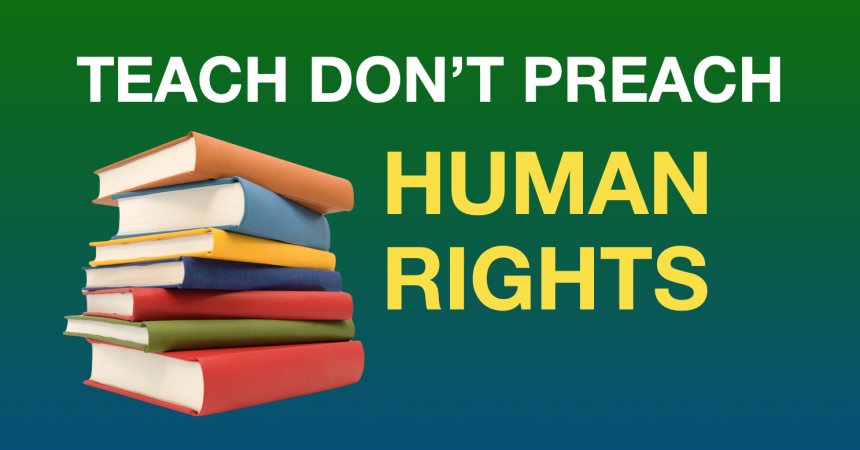
Article 18 (Freedom of Conscience) protects theistic, non-theistic and atheistic beliefs, as well as the right not to profess any religion of belief.
On 14th July Ireland is due before the UN Human Rights Committee under the International Covenant on Civil & Political Rights. This UN Committee will ask the State what it is doing to protect the rights of minorities in Irish schools. In 2008 the Committee in its Concluding Observations raised concern about the religious integrated curriculum in denominational schools. They said that it breached the right to freedom of conscience of secular parents and their children.
The religious education policy of Church and State fails to take on board the fact that Article 18 of the ICCPR (Freedom of Conscience) protects atheists/secularists.
The UN General Comment on Article 18 – Freedom of Conscience states that:-
“2. Article 18 protects theistic, non-theistic and atheistic beliefs, as well as the right not to profess any religion or belief. The terms “belief” and “religion” are to be broadly construed. Article 18 is not limited in its application to traditional religions or to religions and beliefs with institutional characteristics or practices analogous to those of traditional religions. The Committee therefore views with concern any tendency to discriminate against any religion or belief for any reason, including the fact that they are newly established, or represent religious minorities that may be the subject of hostility on the part of a predominant religious community.”
“6. The Committee is of the view that article 18.4 permits public school instruction in subjects such as the general history of religions and ethics if it is given in a neutral and objective way. The liberty of parents or legal guardians to ensure that their children receive a religious and moral education in conformity with their own convictions, set forth in article 18.4, is related to the guarantees of the freedom to teach a religion or belief stated in article 18.1. The Committee notes that public education that includes instruction in a particular religion or belief is inconsistent with article 18.4 unless provision is made for non-discriminatory exemptions or alternatives that would accommodate the wishes of parents and guardians.”
The religious education that is integrated into the curriculum in Irish schools is not in conformity with Article 18 of the ICCPR because it is not delivered in a neutral and objective manner.
Church and State are well aware that a religious ethos influences children because Barrington J. in Campaign to Separate Church and State stated that:-
“The Constitution therefore distinguishes between religious ‘education’ and religious ‘instruction’ – the former being the much wider term. A child who attends a school run by a religious denomination different from his own may have a constitutional right not to attend religious instruction at that school but the Constitution cannot protect him from being influenced, to some degree by the religious ‘ethos’ of the school. A religious denomination is not obliged to change the general atmosphere of its school merely to accommodate a child of a different religious persuasion who wishes to attend that school”.
It has not been defined legally what is meant by religious education / religious instruction and the Supreme Court has never examined these issues in light of the fact that minorities don’t have a choice where they send their children to school. The State has just accepted that it is in order to influence the children of atheist/secularists into a religious way of life as they continue to ‘provide for’ their education in publicly funded private schools that operate a religious ethos. It is difficult to understand how influencing the children of atheists/secularists into a religious way of life accords with the obligation of the State to respect ALL parents convictions under Article 42.1 of the Irish Constitution.
It is clear that this policy is incompatible with Ireland’s Human Rights obligations. Human Rights law obliges the state to ensure that provision is made for non-discriminatory exemptions or alternatives that would accommodate the wishes of parents if they wish to opt their children out of religious instruction/education in schools.
As it stands now there are no non-discriminatory exemptions available and consequently parents cannot ensure that the teaching of their children is in conformity with their convictions. There are no plans to amend the Education Act 1998 to ensure that the human rights of minorities are protected in the education system.
The General Directory for Catechesis of the Catholic Church (Congregation for the Clergy) states that:-
“Those students who are searching, or who have religious doubts, can also find in religious instruction the possibility of discovering what exactly faith in Jesus Christ is, what response the Church makes to their questions, and gives them the opportunity to examine their own choice more deeply.
In the case of students who are non-believers, religious instruction assumes the character of a missionary proclamation of the Gospel and is ordered to a decision of faith, which catechesis, in its turn, will nurture and mature.”
The Guidelines on the inclusion of Students of other faiths in Catholic Secondary Schools refers to this influence as a form of pre-evangelisation and ‘Share the Good News’ (National Directory for Catechesis in Ireland) states that:-
“From the Christian community’s perspective, religious education and faith formation, though distinct, are always connected.”
Whatever happened to the Constitutional right of parents (Article 42 Irish Constitution), to respect for their inalienable right to ensure that the teaching of their children was in conformity with their convictions?
How can atheist/secularists enjoy their human rights when the policy of Church and State is to influence their children into a religious way of life and deny their Human Rights.







1 Comment
”Article 18 (Freedom of Conscience) protects theistic, non-theistic and atheistic beliefs,……”
The problem is…. As an atheist I don’t belief….. I know!!